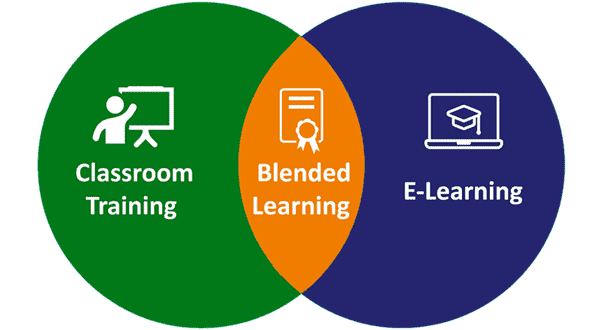Crucial Communication

PURPOSE
“This one is the Cadillac of our communication skills programmes. It is designed to help participants hone their English language skills. The programme caters to spoken and written skills at various levels, from beginners who struggle with the basics of the language to near-native speakers, who can benefit from a detailed intervention in order to help them evolve into expert communicators.”
METHODOLOGY

40 Pre | 20 Training | 40 Post
For us, learning is not an event, and we live this belief, through our design principle of 40:20:40

Guided Discovery Method (GDM)
We use proven and tested adult learning techniques that provides an immersive experience for the delegates.

Blended Learning
We offer a range of learning formats including: Customised Training Programmes | Digital Learning | Executive Coaching
TRAINING FORMATS

Programme Duration: 16 to 80 hours

Programme Duration: 14 to 80 hours

Programme Duration: 75 mins
Audience Profile: Individual Contributors / Young Managers / Mid Managers / Leadership
Trainer Profile: Senior Trainer / Associate Master Trainer / Senior Associate Master Trainer / Master Trainer / Course Director
Pre Training (40%)
STEPS
L1 – Need Analysis
Our focus is to understand the impact matrix of the programme. We meet with the leaders to gain their perspective.
360 Degree Feedback
We can run a 360 degree feedback for the delegates to get a deeper understanding of their standing in the orgainzation.
Pre & Post
Reads
To maximise the training impact, we send contextualised content in a digital format making it easy for the delegates to absorb.
Psychometric Assessment Tool (PAT)
We could also run a PAT which would help us personalise the programme for each delegate based on their communication and leadership styles.
Pre-assessment
We also conduct Assessment to map the participants behaviour, skills and communication in difficult situations.
Pre Training (40%)
This will help build a strong base in English. The key topics covered are:
- Grammar
- Tenses
- Verbs
- Articles
- Singular & Plural etc.
- Word Choice & Sentence Construction
- Clarity of Thought
- Fluency & Clarity
- Lexical Resources (Part 1)
- Sufficient Vocabulary to Discuss Familiar and Unfamiliar Topics
- Ability to Paraphrase
- Voice Modulation (Part 1)
- Ability to Stress Keywords
- Awareness of Non-Verbal Communication
- Functions of the Language (Part 1)
- Indianisms
This would help build on the strong base to ensure that participants are very effective in the way they interact with their stakeholders and clients. The key topics covered are:
Verbal
- Lexical Resources (Part 2)
- Some Ability to Use Less Common and Idiomatic Items
- Awareness of Style and Collocation
- Effective Use of Paraphrase as Required
- Voice Modulation (Part 2)
- Understands the What, Why and How of Voice Modulation
- Application of Stress but Without the Required Sincerity
- Body Language (Part 1)
- Telephone Etiquette
- Fluency & Coherence
- Functions of the Language (Part 2)
- Opening & Closing a Business Interaction
- Listening for Information
Written
- Foundations of Email
- Golden Rules
- Tone – An Introduction
- Subject Lines
- Focus Statements
This would help build further on participants at the intermediate level to ensure that they are even more effective in their interactions. The key topics covered are:
Verbal
- Conversational Ideas
- Voice Modulation (Part 3)
- Situational Stress
- Authentic Conversations
- Body Language (Part 2)
- Inter Cultural Communication
- Fluency & Coherence
- Customer Experience
- Attentive Listening
Written
- Email Etiquette
- Personal Voice
- Audience & Voice
- Lexical Resources (Part 3)
- Range
- Coherence
- Clarity & Conciseness
- Punctuation
Participants are able to put the final touches to become expert communicators. The key topics covered are:
Verbal
- Voice Modulation (Part 4)
- Application at native speaker level
- Conveying humour appropriately
- Para Lingual Messages
- Active Listening
- Small Talk
- Assertiveness
- Executive Presence
- Influencing
Written
- Mail Formats
- Active and Specific Writing
- Concise Language
- Organising Information
- Customising Content
- Formatting
Post Training (40%)
LEARNING APPLICATION TOOLS
Start Stop Continue (SSC)
After the programme we get the delegates to fill out an SSC form, this helps them focus on one learning objective and usually is the basis of the post-training plan.
Coaching
We conduct individual or focused group sessions where the delegates can focus on how they can leverage their strengths to be more effective in a given situation.
Recognition Emails™
To motivate participants, we often send out personalised recognition emails acknowledging and thanking them for their contribution in the programme.
Practice Tasks
Practice tasks allow the delegates to hone their skills in a safe and private environment.
Retention Tools
To help remember all of the content shared, we create retention tools that carry a synopsis of the key topics. These can later be printed and placed at their workstations.
